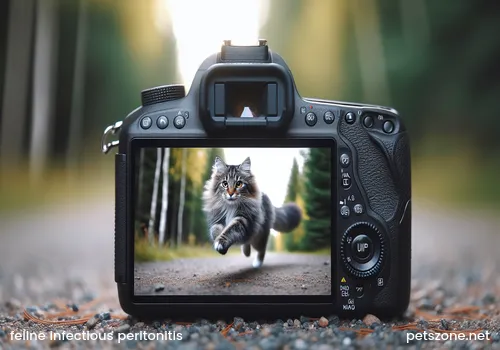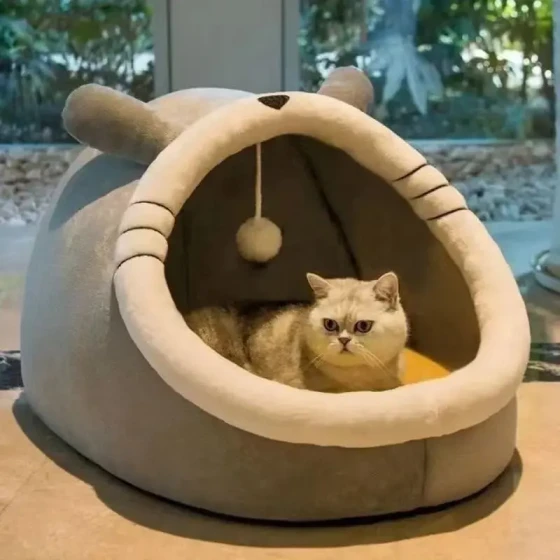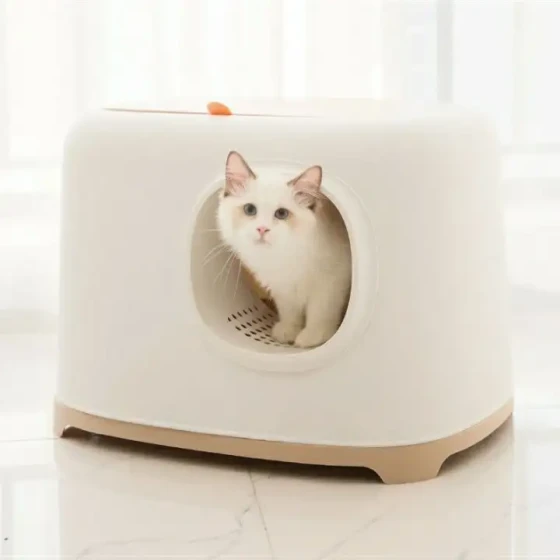Early symptoms of feline infectious peritonitis in cats_How to identify early symptoms and treat in time
Feline infectious peritonitis (FIP), colloquially called "cat infectious peritonitis," is a very dangerous disease for cats caused by mutation of feline coronavirus. Early identification of FIP symptoms is crucial because it can buy valuable time for timely treatment. The early signs of FIP are usually non-specific and easily confused with other diseases, but careful observation can still detect some clues, mainly including: persistent or fluctuating fever, lethargy, decreased appetite or even anorexia, weight loss, etc. If a cat shows these signs, especially young cats or those from multi-cat environments, high vigilance is necessary and prompt veterinary examination is recommended.
Feline infectious peritonitis (FIP) is a global fatal disease caused by mutation of feline coronavirus (FCoV). While many cats may be infected with feline coronavirus, only a few experience viral mutations that develop into highly pathogenic feline infectious peritonitis virus (FIPV). Once mutated, the virus attacks immune system cells and can cause systemic inflammation affecting multiple organs including the abdomen, chest, brain, eyes, kidneys, liver, etc. This disease was once considered a "death sentence" for cats with very poor prognosis, but new antiviral drugs emerging in recent years have brought new hope. Nonetheless, early detection and diagnosis remain key to improving treatment success rates.
Early Signs of FIP: Unignorable "Small Signals"

The early symptoms of FIP are usually hidden and atypical, easily mistaken for a common cold or gastrointestinal discomfort. It is precisely these seemingly ordinary "small signals" that may be early warnings of the disease. Cat owners need to be vigilant and carefully observe their cats’ daily behavior and physical condition changes.
Common early symptoms of FIP include:
- Persistent or fluctuating fever: This is one of the most common early symptoms of FIP. The cat’s body temperature remains elevated or fluctuates with episodes of fever and remission. This fever usually does not respond to antibiotic treatment. You may feel the cat’s ears, nose, or abdomen are unusually warm. Normal cat temperature is around 38℃ to 39.5℃; if it stays above this range, attention is needed.
- Lethargy and sleepiness: The sick cat becomes quieter than usual, less active, and sluggish to external stimuli. They may sleep for a long time and appear listless even when awake, showing no interest even in favorite toys or treats.
- Decreased appetite or anorexia: Cats may become picky eaters, reduce food intake, or completely refuse food. Do not underestimate this; changes in appetite often reflect important health status.
- Weight loss: Despite reduced appetite, the cat’s weight decreases. This weight loss may be gradual and not immediately noticeable, but a significant drop without intentional diet requires concern. Some sources mention weight loss of 15%-20% within a short time might indicate FIP or other serious diseases.
- Dull and messy fur: Sick cats often neglect grooming, causing coat to become rough, dull, and appear "untidy."
In addition to these general early symptoms, depending on the organs affected by the virus, other signs may appear early, although these usually indicate some progression of disease, but understanding them helps more comprehensive risk identification:
- Abdominal changes: While obvious ascites is a typical late sign of wet FIP, mild abdominal swelling or tenderness/discomfort may be felt in early stages.
- Digestive symptoms: Some cats may exhibit vomiting or diarrhea early on.
- Behavior changes: Sick cats may show abnormal behavior such as becoming more clingy or aloof, or developing pica (eating non-food items).
How to Identify Early Symptoms and Treat in Time?
Recognizing early FIP symptoms is like playing "spot the difference," requiring carefulness and patience. Since early signs are nonspecific, relying on these symptoms alone makes diagnosis difficult. Therefore, as responsible cat owners, the most important point is: once any persistent or recurring symptoms are noticed, even if mild, you should immediately take the cat to a regular veterinary hospital for examination. Do not adopt a "wait and see" attitude because FIP can progress rapidly.
When visiting the vet, be sure to provide detailed descriptions of all symptoms, duration, and any abnormal changes observed. The veterinarian will make an initial judgment based on clinical symptoms, medical history, breed (purebred, young cats, cats in multi-cat households have higher risk), and related information.
For more accurate diagnosis, the vet may recommend a series of tests including:
- Blood tests: Including complete blood count and biochemical tests. Although no single indicator confirms FIP directly, certain changes may suggest its possibility such as lymphocyte decrease, decreased albumin/globulin ratio, etc.
- Imaging tests: Such as X-ray or ultrasound, to check for fluid accumulation in the abdomen or chest or organ abnormalities.
- Effusion analysis: If the cat has chest or abdominal fluid, fluid sampling and analysis is crucial for diagnosing wet FIP. FIP fluid is usually yellow, viscous, and high in protein.
- Coronavirus detection: PCR or other methods can detect feline coronavirus in feces, blood, or fluid. Note that detecting coronavirus in a cat does not mean it has FIP, as many healthy cats carry the virus. A positive result raises suspicion but must be combined with other test results for diagnosis.
- Other more specific tests: In some cases, vets may consider more specific testing such as detecting viral antigens in macrophages or tissue biopsies.
FIP diagnosis is challenging since there is no "gold standard" test and requires a comprehensive assessment.
If a cat is unfortunately diagnosed with FIP, do not despair. Formerly a fatal disease, effective treatments now exist, especially new antivirals like GS-441524 that have shown remarkable efficacy in many cases. Early, timely, and standardized treatment is critical to improving the cure rate. Veterinarians will tailor treatment plans based on the cat’s condition, which may include antiviral drugs, supportive care (fluid therapy, nutritional support), and inflammation control.
Frequently Asked Questions
Q1: Can FIP be transmitted to humans or other pets?
A: FIP is caused by mutated feline coronavirus which is species-specific and typically only spreads among felines. It does not transmit to humans or other animal species.
Q2: Can healthy cats carry feline coronavirus?
A: Yes, feline coronavirus is very common among cat populations, especially in multi-cat homes or catteries. Many healthy cats can carry the virus without ever developing FIP.
Q3: Is stress related to FIP occurrence?
A: Studies suggest stress may trigger coronavirus mutation leading to FIP. Reducing stress and providing a stable environment helps lower risk.
Q4: Can FIP be prevented?
A: Currently no vaccine can reliably prevent all strains from causing FIP. Prevention focuses on reducing viral spread by maintaining hygiene especially litter box cleanliness, minimizing close cat contact, and lowering stress.
Q5: How much does FIP treatment cost?
A: Treatment costs depend on factors such as FIP type (dry or wet), severity, drug selection, treatment duration, and local expenses. Effective antiviral drugs are relatively expensive, with treatment possibly lasting weeks or months, leading to costs of several thousand to tens of thousands of RMB. However, this investment is worthwhile for saving the cat’s life.
Summary
FIP is a concerning disease, but early symptom recognition and prompt professional medical help are key to improving cure rates. As cat owners, we should observe carefully, learn more, understand early FIP signals, and not ignore any suspicious signs. Remember, every minute earlier detection increases the chance of survival. Providing a healthy, happy living environment, regular health checks, and good communication with veterinarians are our strongest tools in protecting our cats’ health.
References
- Wikipedia: Feline infectious peritonitis
- International Cat Care: Feline infectious peritonitis (FIP)
- VCA Animal Hospitals: Feline Infectious Peritonitis - FIP in Cats
- Fengyuan Biotechnology: Why Do Cats Get FIP? Understanding Symptoms and Prevention of Feline Peritonitis
- FipMed: Stages of FIP and Symptoms based on Stages of FIP
- Purina US: FIP in Cats: Symptoms & Treatment
- Fuzhou Qianchong Bai’ai Pet Hospital: The Significance of Treating Feline Coronavirus to Prevent FIP
- WebMD: Feline Infectious Peritonitis(FIP): Symptoms, Causes, and Treatments
- PetMD: Feline Infectious Peritonitis (FIP) in Cats
- Douban Diary: Understand FIP in 5 Minutes!
- Noble Veterinary Clinics: Feline Infectious Peritonitis: Types, Symptoms, and Treatment
- PMC: Diagnosis of Feline Infectious Peritonitis: A Review of the Current Literature
- PDSA: Feline infectious peritonitis (FIP) in cats
- Aichong Network: Early Symptoms of FIP Must Not Be Ignored
- Latest Treatment Options and Hope for Cats with Feline Infectious Peritonitis (FIP)
- Horse & Cat Vet Wairarapa: Feline Infectious Peritonitis FIP
- DNA Vetcare: Feline Infectious Peritonitis (FIP): What every cat owner needs to know
- MDPI: Feline Infectious Peritonitis Effusion Index: A Novel Diagnostic Method and Validation of Flow Cytometry-Based Delta Total Nucleated Cells Analysis on the Sysmex XN-1000V®
- Online Pet Vet Consultation: Main Symptoms of FIP? Typical Symptoms of FIP?
- Xuzhou Yetu Pet Supplies Co., Ltd.: Important Notes on FIP Treatment
- FAQs About Feline Infectious Peritonitis (FIP): A Resource for Pet Parents and Veterinarians
- Pet Health Club: FIP in Cats: Feline Infectious Peritonitis
- Baidu Health
- Beijing Ornamental Animal Hospital: Basic FIP Knowledge
- News Channel: Causing Over 300,000 Cat Deaths! What Kind of Coronavirus Is This? Can It Infect Humans?
- Pet Doctor Network: Comprehensive Understanding of FIP
- Ark Biotechnology: The Silent Killer — Feline Infectious Peritonitis
- Pet Doctor Network: Neurological and Ocular FIP (Feline Infectious Peritonitis)
- Douban Diary: What Is Cat Stress? How to Identify Stress? Why Do Cats Get Stressed?
- Google Patents: A Cat FIP Treatment Paste and Its Preparation Method



